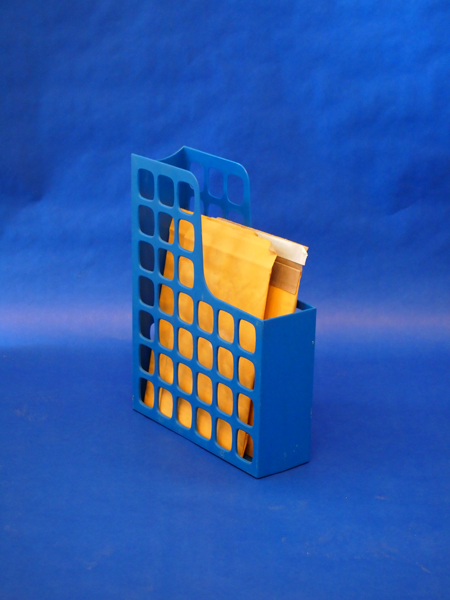![]() body | color | collections | commodity | cube | document | fabric | fetish | gender | glass | home | identity | living | machine | metal | minimal | mobility | narrative | olfactory | organic |
body | color | collections | commodity | cube | document | fabric | fetish | gender | glass | home | identity | living | machine | metal | minimal | mobility | narrative | olfactory | organic |
![]() pain | paper | plastic | plugs | power | protective | rectangular | ritual | round | sound | souvenir | spiritual | style | text-based | time | tool | touch | uniform | value | visual | warm | wood
pain | paper | plastic | plugs | power | protective | rectangular | ritual | round | sound | souvenir | spiritual | style | text-based | time | tool | touch | uniform | value | visual | warm | wood
| Plastic: Blue Shelving Box Containing Mailers | |||
Narrative: Blue Shelving Box Containing Mailers The paper was made from pulp obtained by chemical means, known as kraft pulping. Chips of wood were placed in a large, sealed container known as a digester. The digester contained a strongly alkaline solution of sodium hydroxide and sodium sulfide. Bleaching removes lignin and involves mixing the pulp with a series of oxidizing chemicals that react with the lignin. After each mixture, the pulp was washed with an alkaline solution that removes the treated lignin. Fillers were added to the pulp. (A typical filler is a clay known as kaolin. Other chemicals often added to pulp include starches or gums. Rosin and alum are often added as sizers, making the paper less absorbent.) Pulp was added to water to form slurry in order to make paper with an even density. The slurry was pumped onto a moving mesh screen made up of very fine wires of metal or plastic. Water drained through the small openings in the mesh, and formed a sheet of wet material from the slurry. The sheet was moved on a series of belst made of felt containing wool, cotton, and synthetic fibers. The dried sheets moved between rollers known as calendars to make it smooth. Petroleum refineries; Power generation and supply; Plastics material and resin manufacturing; Coal mining; Alumina refining and primary aluminum production; Other basic organic chemical manufacturing; Oil and Gas extraction; Motor vehicle parts and manufacturing; Truck transportation; Oil and gas extraction; Iron and steel mills. Land use includes: Logging; Forest nurseries, forest products, and timber tracts; Cattle ranching and farming. I acquired this plastic organizer from Materials for the Arts in Long Island City NY, a warehouse of goods donated to artists and arts organizations. The mailers were purchased from Staples in 2004 for David Ratzlow's CD club. 12 members mailed CD's to the other 12 members once a month for a year.
|
 |
||
![]()
